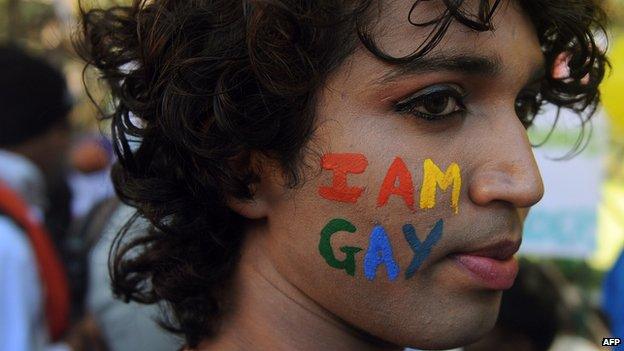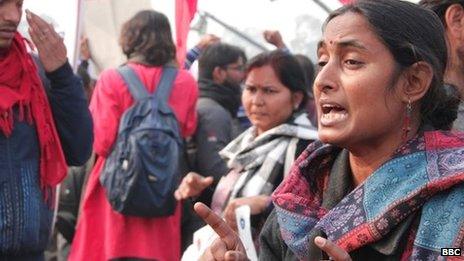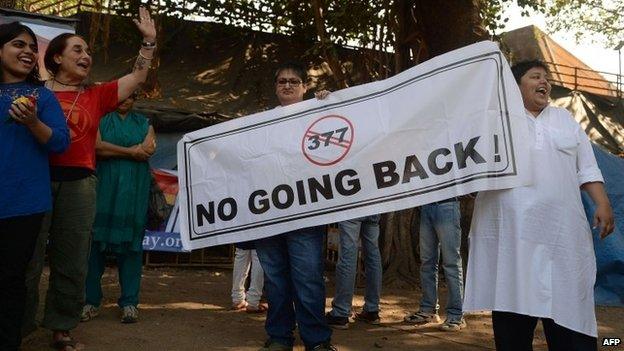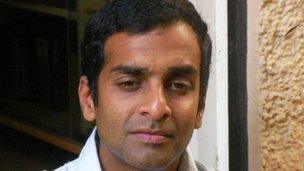India gay sex ruling: 'It is a huge setback'
- Published

The 2009 court ruling decriminalising gay sex had emboldened many Indians to come out of the closet
India's Supreme Court has upheld a law which criminalises gay sex, in a ruling seen as a major blow to gay rights. The court ruling reverses a landmark 2009 Delhi High Court order which had decriminalised homosexual acts.
According to Section 377, a 153-year-old colonial-era law, a same-sex relationship is an "unnatural offence" and punishable by a 10-year jail term. Here is a cross-section of views from India on the Supreme Court order.
Zafaryab Jilani, Muslim leader and petitioner in the case, Lucknow
The Supreme Court has upheld the moral values of India. Laws are made to protect what is "right" and that is what the court has done today.
Many consensual relationships of this unnatural nature have existed in India for decades, but that does not justify giving them legal or constitutional sanctity.
This is an unnatural phenomenon and it is correct to criminalise it.
We are living in India, this is not America, and according to the morals of our society, this is a correct judgement.
The Supreme Court has understood the feelings of the majority populace of the country and delivered its order accordingly.
Kavita Krishnan, women's rights activist, Delhi

"The Supreme Court order has set a very bad precedent"
The Supreme Court's decision is a huge embarrassment. It is supporting patriarchal and religious forces instead of siding with constitutional reason.
It is a setback to all minorities in the country.
In a modern democracy, we expect the Supreme Court to protect the rights of the marginalised and underprivileged, whether they are women, children, poor or sexual minorities.
How we live our personal lives, within the four walls of our house, should not be subjected to any moral policing or any mob rule.
We cannot accept the narrow beliefs, understandings and diktats of religious groups to dictate the laws of our country.
What if tomorrow religious groups decide that inter-caste or inter-religious marriages are against the moral values of our society, then would the court make, amend or uphold laws accordingly?
This is setting a very bad precedent.
Vivek Gunpal, student, Nagore, Rajasthan
Homosexuality is against the rule of nature. Gays should not be given any kind of support. They want something that is illegal to gain legitimacy but that is not acceptable. They should be banned.
They are trying to spread filth in the society, but you cannot allow anyone to do anything in the name of modernity.
Homosexuality is a Western import - we have assimilated some good aspects of their culture but this is a bad aspect of their culture. We cannot ape the West blindly, otherwise how will we protect our culture?
The Supreme Court order is very good - it will go a long way in maintaining the rule of nature and protect Indian culture and tradition.
The new generation is very liberal, and so am I, but I do not approve of homosexuals polluting our society. There has to be a limit.

The Supreme Court ruling has come as a huge shock to many in India
Gautam Bhan, gay rights activist, Delhi
I am a member of Voices Against 377 which is a coalition of LGBT [lesbians, gays, bisexuals and transgender people], women and human rights activists.
Our Constitution guarantees equality and it is the duty of the court to protect this, but in this judgement the Supreme Court has done exactly the opposite.
By taking back this legal status, the court has in a way said that because of the different identity of some citizens, their rights might be violated.
As the world moves to more equal rights for the transgender community, this judgement comes as a setback in the Indian context.
However, the movement is much stronger now than it was when the petition to decriminalise homosexuality was originally filed in the year 2001.
We never thought that this fight for equal rights would be an easy one and our movement will continue with equal fervour.
Subrat Kumar Pati, journalist, Bhubaneswar, Orissa
I welcome the Supreme Court order, it is a correct judgement, it's good for our society. In the name of people's rights, we cannot accept everything.
The court order does not violate anyone's rights. Homosexuality does not belong to our culture, it's not accepted culturally in our society and I don't think it's important for our society to legalise it.
You often read about gay relationships in the West, but such things are not common here. And even if people are gay, they don't come out in the open probably because they themselves believe they are doing something wrong.
I don't know anyone among my friends, relatives and family who is gay and if someone was, I will not be able to accept it.
Arvind Narrain, lawyer and defendant in the case, Bangalore

"We will ask the court to reconsider their opinion"
This judgement is the betrayal of the constitutional history of India as it has betrayed the principle of inclusiveness, betrayed the principle that majorities cannot discriminate against minorities, and it has betrayed the idea that all people irrespective of their sexual preference or gender identity have the right to live with dignity.
But remember in the four years since the Delhi High Court judgement, people have experienced a new sense of freedom, and that freedom no judgement can take away from us.
The Delhi High Court had very rightly said at that time that rights cannot be "conferred", they are merely "confirmed", which means that the right to dignity is an inalienable part of us and no court on Earth has the right to take away the right to dignity from us.
We want to study the detailed order of the Supreme Court, explore our legal options and then go back to the court to ask them to reconsider their opinion.
Interviews conducted by Divya Arya and Geeta Pandey.
- Published11 December 2013
- Published11 December 2013